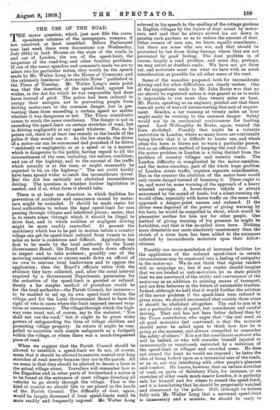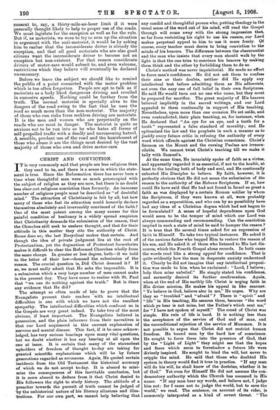THE USE OF THE ROAD. T HE motor question, which just
now fills the corre- spondence columns of the newspapers, remains, if not unsolved, at least unsettled. Before Parliament rose last week there were discussions (on Wednesday, July '29th) in both Houses on the state of the roads, in and out of London, the use of the speed-limit, the iniquities of the road-hog, and other familiar problems. If out of the many speeches and comments made we are to select two for particular notice, they would be the speech made by Mr. Walter Long in the House of Commons, and the extremely luminous "Automobile Notes" published in the Times of Tuesday. Mr. Walter Long's main point was that the insertion of the speed-limit, against his wishes, in the Act for which he was responsible had done harm instead of good. The police had been induced to occupy their energies, not in preventing people from driving motor-cars to the common danger, but in pre- venting them from exceeding a certain speed no matter whether it was dangerous or not. The Times contributor comes to much the same conclusion. The danger is not in exceeding the speed-limit on certain stretches of road, but in driving negligently at any speed whatever. But, as he points out, there is at least one remedy in the hands of the police if they would use it. As the law stands, the driver of a motor-car can be summoned and punished if he drives "recklessly or negligently, or at a speed or in a manner which is dangerous to the public, having regard to all the circumstances of the case, including the nature, condition, and use of the highway, and to the amount of the traffic which actually is at the time, or might reasonably be expected to be, on the highway." The net could hardly have been spread wider to catch the inconsiderate driver. But the Act has certainly not abolished inconsiderate driving. The question is whether further legislation is needed, and if so, what form it should take.
There is at least one direction in which facilities for prevention of accidents and annoyance caused by motor- cars might be extended. It should be made easier for local authorities to reduce the legal speed-limit for cars passing through villages and inhabited places ; easier, that is, to create zones through which it should be illegal to drive fast, and in which reckless or negligent driving might be more readily controlled. At present the machinery which has to be put in motion before a country village can get its speed-limit reduced from twenty to ten miles an hour is cumbrous and difficult. Application has first to be made by the local authority to the Local Government Board ; the Board then sends down officials to inspect and to take evidence ; possibly one of the motoring associations or unions sends down an official of its own to canvass local landowners and to oppose the application; then the Board's officials retire with the evidence they have collected, and, after the usual interval required by a Government Department, permission for the reduction of the speed-limit is granted or refused. Surely a far simpler method of procedure would be for the local authority—the Parish Council, for instance— to be enabled to set up its own speed-limit within the village, and for the Local Government Board to have the right of veto in eases where the limit imposed seemed vexa- tious or unnecessary. The village through which the high- way runs must not, of course, say to the motorist, "You shall not use the road," but it ought to be given wider powers of safeguarding the lives of village children and protecting village property. In return it might be com- pelled to maintain such simple safeguards as a footpath within the village, or where there was a much-frequented piece of road.
When we suggest that the Parish Council should be allowed to establish a speed-limit we do not, of course, mean that it should be allowed to exercise control over long stretches of road merely because they are in the parish. All we mean is that they should be allowed to decree a limit in the actual village street. Travellers will remember how in the Engadine and in other parts of Switzerland a notice is to be found at the entrances of most villages directing all vehicles to go slowly through the village. That is the kind of control we should like to see placed in the hands of the Parish Council. The difficulty of dust, again, would be largely decreased if local speed-limits could be more readily and frequently imposed. Mr. Walter Long referred in his speech to the spoiling of the cottage gardens in English villages by the layers of dust raised by motor- cars, and said that he always slowed his ear down in passing such gardens so as to reduce the amount of dust. Other owners of cars are, we know, equally considerate ; but there are some who are not, and they should be prevented by law from doing damage where they are not prevented by good feeling. The dust problem is, of course, largely a road problem, and some day, perhaps, we may arrive at dustless roads. We have not got them yet, and motorists must use what we have with as much consideration as possible for all other users of the road. - Some of the remedies proposed, both for inconsiderate driving and for other difficulties, are clearly useless. One of the suggestions made to Mr. John Burns was that no car should be registered unless it was geared so as to make it impossible to run more than twenty miles an hour. Mr. Burns, speaking as an engineer, pointed out that there were all sorts of ways of circumventing that sort of require- ment. Besides, a ear running at twenty miles an hour might easily be running to the common danger. Safety would not lie in mechanical contrivances for limiting speed. Lord Willoughby de Broke, again, wanted the horn abolished. Possibly that might be a valuable restriction in London, where so many horns are continually being blown that it is difficult to locate one, and where often the horn is blown not to warn a particular person, but as an offensive method of keeping the road clear. But the motor problem in London is a thing distinct from the problem of country villages and country roads. The London difficulty is complicated by the motor-omnibus, and the motor-omnibus, part of the whole huge problem of London street traffic, requires separate consideration. But in the country the abolition of the motor-horn would only create danger instead of lessening it. There ought to be, and must be, some warning of the approach of a heavy wheeled carriage. A horse-drawn vehicle is always announced by the sound of hoofs, but a silent-running car would often, especially with horse traffic on the same road, approach a danger-point unseen and unheard. If the driver were deprived of the power of giving warning by his horn, he would be compelled to shout, which would be pleasanter neither for him nor for other people. One method of giving warning of his presence he might be forbidden, and that is the so-called siren horn. Nothing more detestable nor more absolutely unnecessary than the shriek of a siren horn has been added to the nuisances inflicted by inconsiderate motorists upon their fellow- citizens.
Possibly our recommendation of increased facilities for the application of the reduced speed-limit in certain circumstances may be construed into a feeling of antipathy to the motor-car. We do not think that regular readers will so misjudge us ; but if any reader should imagine that we are briefed as anti-motorists, let us state plainly that we are convinced of the utility and convenience of the motor-car as an addition to existing means of transport, and are firm believers in the future of automobile traction. Indeed, although we hold that it would further the solution of the motor problem if the speed-limit were reduced in given areas, we should recommend that outside those areas it should be abolished altogether. The end to aim at is not a particular rate of speed, but considerate and careful driving. That end has not been better defined than by the Times contributor, who urges that "the real need, as all good motorists feel convinced, is that the motorist should never be called upon to think how fast he is going at the moment, and always compelled to remember the safety of others." It is not the considerate motorist who will be balked, or who will consider himself injured. or unnecessarily or vexatiously restricted by a reduction of the speed-limit in villages and crowded areas. He does not exceed the limit he would see imposed ; he hates the idea of being looked upon as a tyrannical user of the roads, or as in any way interfering with other people's pleasure and comfort. He knows, however, that on certain stretches of road, on parts of Salisbury Plain, for instance, or on stretches of other roads much nearer London, it is perfectly safe for himself and for others to exceed the speed-limit, and it is humiliating that he should be perpetually watched and threatened by the police. Still, although we believe fully with Mr. Walter Long that a universal speed-limit is unnecessary and a mistake, we should be ready to consent to, say, a thirty-mile-an-hour limit if it were generally thought likely to help to proper use of the roads. We must legislate for the exception as well as for the rule. But if, as motorists, we were to try to sum up the situation in argument with the anti-motorist, it would be by asking him to realise that the inconsiderate driver is already the exception, and that all good motorists who are also good citizens want the inconsiderate driver to become not an exception but non-existent. For that reason considerate drivers of motor-cars would submit to, and even welcome, restrictions which they believe Till eventually be declared unnecessary.
Before we leave the subject we should like to remind the public of a point connected with the motor problem which is too often forgotten. People are apt to talk as if motorists as a body liked dangerous driving and revelled in excessive speeds. Nothing could be further from the truth. The normal motorist is specially alive to the dangers of the road owing to the fact that he uses the road so much more than the non-motorist. The majority of those who run risks from reckless driving are motorists. It is the men and women who are perpetually on the roads who are most in danger. The motorist is quite as anxious not to be run into as he who hates all forms of self-propelled traffic with a deadly and unreasoning hatred. A sensible, prudent use of the road and the banishment of those who abuse it are the things most desired by the vast majority of those who own and drive motor-cars.



































 Previous page
Previous page